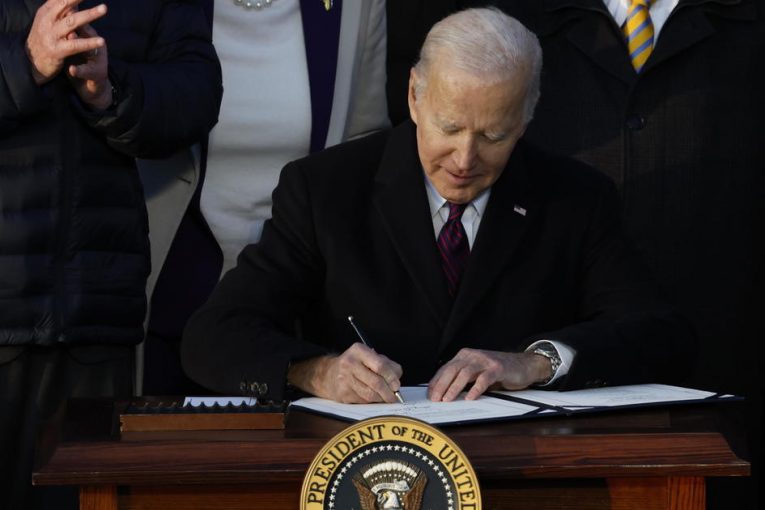

By Michael Apfel
WASHINGTON, DC – On New Year’s weekend, President Biden presented a list of six people he granted full pardons to before the start of 2023.
On that list is Gary Parks Davis, a 66-year-old man from Arizona who pleaded guilty to using a telephone in facilitating an unlawful cocaine transaction when he was 22. After serving a six-month sentence on nights and weekends in a county jail, he earned a bachelor’s degree and managed his own landscaping business.
Davis became more involved in his community, fundraising for his local rotary club and chamber of commerce and serving as the president and treasurer for the local high school’s booster club, even after his children had graduated.
Also pardoned is Edward Lincoln De Coito, III, from Dublin, California. The 55-year-old man pleaded guilty when he was 23 for involvement in a marijuana trafficking conspiracy; his involvement was limited to being a courier on five or six different occasions. He began the terms of his imprisonment in March 1999 and was released from custody in December, 2000.
He served honorably in the U.S. Army and the Army Reserves before his offense, receiving awards for his service such as the Southwest Asia Service Medal, Army Good Conduct Medal, and the Humanitarian Service Medal. Following release, De Coito worked as an electrician for 15 years and is now pursuing a second career as a pilot.
Another pardon went to Vincente Ray Flores from Winters, California, a 37-year-old man who, when he was 19, pleaded guilty at a special court-martial for illegally consuming Ecstasy and alcohol while serving in the military. In exchange for his plea, he was referred to a six-month rehabilitation program for Air Force officers and an opportunity to return to duty after treatment.
A reduction in his rank was amended following his therapy. Flores remains on active duty and has received commendations for his excellence, receiving the Global War on Terrorism Expeditionary Medal, the Air Force Expeditionary Service Ribbon with Gold Border, the Air Force Outstanding Unit Award, the Air Force Commendation Medal, and the Meritorious Unit Award.
Flores now serves on the Honor Guard, training others for Honor Guard ceremonies, and volunteers for a number of military-related causes including Habitat for Humanity, a cancer research fundraiser, and events for military members returning from deployment.
Also pardoned is Beverly Ann Ibn-Tamas from Columbus, Ohio, an 80-year-old woman convicted of second-degree murder of her former husband. She was 33 years old at the time, and testified that, prior to her pregnancy, her husband frequently subjected her to physical and verbal abuse, threatening her in the moments before she shot and killed him.
The court refused to allow expert testimony regarding battered woman syndrome during her trial, a condition and pattern of behavior that develops in victims of domestic violence. Ibn-Tamas was sentenced to a term of one to five years’ incarceration, with credit for time served. Her appeal marked a noteworthy step towards judicial recognition of battered woman syndrome, with her case serving as an example for numerous academic studies. Ibn-Tamas was the Director of Nursing for an Ohio-based healthcare business, and continues to work as a case manager with the organization.
Another pardoned recipient is Charles Byrnes Jackson from Swansea, South Carolina, a 77-year-old man who pleaded guilty to one count of possession and sale of distilled spirits without tax stamps. The possession and sale, occurring when he was just 18, involved a single illegal whiskey transaction.
He received five years’ probation in 1964, preventing him from pursuing his dream and joining the United States Marine Corps after high school. Jackson completed his probation term in June 1969. He has been an active member of his church since 1987, using his carpentry skills to help many in his community and to maintain and renovate church buildings.
And, John Dix Nock, III, of St. Augustine, Florida is pardoned, too. He is a 72-year-old man who pleaded guilty to one count of renting and making for use, as an owner, a place for the purpose of manufacturing marijuana plants 27 years ago.
He did not cultivate marijuana, nor did he play a role in the grow-house conspiracy, but he was sentenced to six months’ community confinement in 1996 in lieu of imprisonment, along with three years’ supervised release.
Nock paid the government the value of the home he rented to his brother and completed community confinement in March 1997 without incident. He now operates a general contracting business and mentors young contractors. Since 1999, he has helped to organize an annual charitable fishing tournament for abused young men.